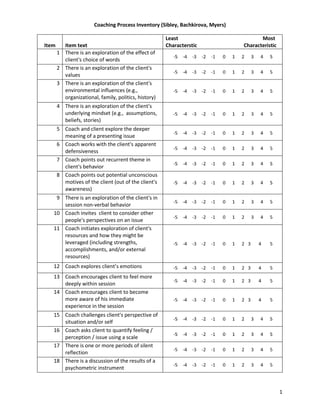
Coaching Process Inventory Explained
- 1. Coaching Process Inventory (Sibley, Bachkirova, Myers) Least Most Item Item text Characterstic Characteristic 1 There is an exploration of the effect of client's choice of words 2 There is an exploration of the client's values 3 There is an exploration of the client's environmental influences (e.g., organizational, family, politics, history) 4 There is an exploration of the client's underlying mindset (e.g., assumptions, beliefs, stories) 5 Coach and client explore the deeper meaning of a presenting issue 6 Coach works with the client's apparent defensiveness 7 Coach points out recurrent theme in client's behavior 8 Coach points out potential unconscious motives of the client (out of the client's awareness) 9 There is an exploration of the client's in session non-verbal behavior 10 Coach invites client to consider other people's perspectives on an issue 11 Coach initiates exploration of client's resources and how they might be leveraged (including strengths, accomplishments, and/or external resources) 12 Coach explores client’s emotions 13 Coach encourages client to feel more deeply within session 14 Coach encourages client to become more aware of his immediate experience in the session 15 Coach challenges client's perspective of situation and/or self 16 Coach asks client to quantify feeling / perception / issue using a scale 17 There is one or more periods of silent reflection 18 There is a discussion of the results of a psychometric instrument 1
- 2. 19 There is a discussion of external feedback 20 Coach gives feedback from coach’s experience of client 21 Coach discloses own feelings/ bodily sensations evoked in the session 22 There appears to be a productive use of metaphors 23 Coach and client explore their differences in perception of the situation 24 Coach expands on client's statements 25 Coach provides reassurance to client 26 Coach uses humor 27 Coach shows empathy 28 Coach shares personal details about herself 29 Coach discloses own fallibility 30 There appears to be rapport (strong connection) between client and coach 31 Coach and client appear to understand each other 32 Coach and client discuss their relationship 33 Coach asks for permission to give feedback 34 Coach repeats client's words back to him 35 Coach paraphrases the client's statements 36 Coach checks if her understanding is correct 37 There is a sense of optimism in the coaching session 38 There appears to be a shift in energy during the coaching session 39 Coach and client appear to be engaged (vs. disengaged) 40 Coach follows up on key / significant statements made by client 41 Coach asks questions helping the client to elaborate 42 There is a discussion of the coaching “contract” 2
- 3. 43 There is a discussion of issues related to the termination of coaching 44 There is a discussion of boundaries and/or ethical issues related to the coaching engagement 45 There is a discussion of a potential referal to an outside specialist (e.g., therapist, doctor, financial advisor) 46 The session is fast-paced 47 The session appears highly structured 48 Coach and client appear to bring the session to closure easily 49 Coach and client discuss the process of the session 50 Coach takes an active role during the session 51 Coach makes explicit a shift in role during the session (e.g., acting as consultant, teacher, therapist) 52 Coach explains the reason behind using a specific intervention 53 Coach appears to be using an intervention mechanistically 54 Coach appears to be pursuing her own agenda 55 Client takes initiative in structuring the session 56 There is a discussion of client's feedback on coaching 57 Coach makes sounds or non-verbally encourages client to continue 58 Coach is verbose 59 Coach interrupts client 60 Client interrupts coach 61 Coach suggests in-session exercise / activity 62 Coach broadens the focus of discussions 63 Coach asks questions that appear to open new possibilities for the client 64 Coach appears to focus on a third- party's agenda (e.g., organization, partner, parents) 65 Client suggests his next course of action 3
- 4. 66 There is a discussion of new practices for the client 67 Coach offers possible solutions 68 Coach suggests homework for client 69 Coach shares her knowledge about topic 70 Coach gives advice 71 Coach follows up on previous homework 72 Coach encourages client to make choices 73 Coach asks the client to describe key learnings / take-aways from session 74 There is a discussion of the client's progress 75 There is a discussion about the client’s overall goals 76 There is a discussion about how to measure the success of the coaching engagement 77 Coach redirects client to client’s agenda 78 Coach explores client's level of engagement in coaching 79 Coach inquires about client's aim for the session 80 There is a discussion of the client's impact on his environment (e.g., organization, family) 4
